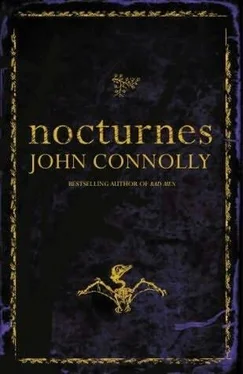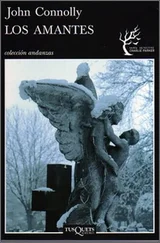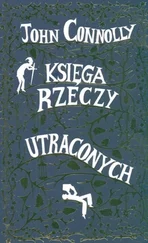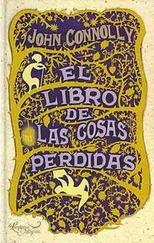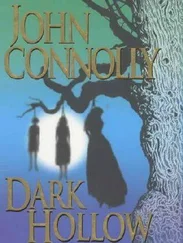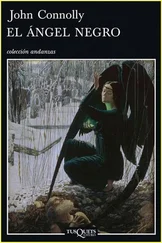But I was not sure that I believed all that I was saying, for I saw John Grady’s eyes turn upon me in the mirror, and his lips formed the single word:
No.
Grass seemed to hear it, and the doubt left his eyes. He forced the gun harder against the girl’s skull, then lifted the sack up, holding his prize beneath his arm as he began retreating up the stairs. I followed him all the way, reaching the top of the steps as he moved into the hallway, his back to the wall as he made for the safety of his vehicle parked outside.
Two figures blocked the doorway.
“Now where do you think you’re going?” said Louis. He stood on the porch with his gun raised before him. Angel knelt below him, his own gun pointed at Grass. Seconds later, I added a third.
Grass stopped, caught between us.
“Let her go,” I said. “It’s all over.”
Grass was shaking his head, muttering something that I couldn’t understand. He stared straight ahead and saw his reflection in the mirror. I couldn’t see what he was looking at because the angle was wrong, but it was clear from the expression on his face that I wasn’t the only one hallucinating in the Grady house.
“Chief, you rescued Denny Maguire from here,” I said. I could hear the desperation in my voice. “Remember? You brought him out. You saved his life. You saved a child’s life. You’re not a killer. This is not you. It’s the house. Listen to me. It’s not your fault. It’s something in the house.”
Slowly, Grass released his grip on the sack and let it fall to the floor, although his gun remained pointing at it. I could hear the girl crying, but I thought that I could also hear another voice. It was whispering, spilling foul words into Grass’s ear.
“Don’t listen to him,” I said. “Please. Just put the gun down.”
Grass’s face crumpled. He began to cry, and I was reminded of Denny Maguire weeping in his bar: two men, linked by the evil of John Grady.
“Chief,” I said.
He raised the gun and pointed it at the mirror before him.
“Put it down,” I said.
Grass was sobbing now.
“This is not a house,” he said.
He cocked the pistol-“This is not a house,” he repeated-and turned to look at me as the gun suddenly swung toward him, the muzzle coming to rest against his temple.
“This is-”
He pulled the trigger, and the walls went red.
The figure behind the mirror stared at me as I knelt down and undid the rope that held the sack closed. The girl from the picture lay inside, her hands and feet tied and a red bandana gagging her mouth. I undid the gag first, then her hands and feet, but I did not let her look at the mirror behind me, or at the body of the man who had brought her to this place.
“I want you to go with my friends,” I said. “They’ll take care of you until I come out.”
She was crying, and she tried to hold on to me, but I forced her gently away into Angel’s arms.
“It’s okay,” he said, as he led her away. “Nobody’s going to hurt you now.”
I watched her until she was gone from sight. Louis remained in the doorway, waiting.
I approached the glass, my gun raised. John Grady’s dead eyes grew large and his lips moved faster and faster.
“Lights out,” I said, then fired.
And the mirror shattered as the process of erasing John Grady’s image from the world began.
Two days later, I watched as a team of workmen removed every remaining mirror from the Grady house and placed them in the back of one of Matheson’s trucks. Matheson himself was beside me, watching all that was being done.
One of the workmen approached us and said: “We were pretty careful with those mirrors. They’re antiques. Could be worth some money, you was to restore them some.”
“They’re going to be destroyed,” I said.
The workman looked to Matheson in the hope of an alternative response.
“You heard the man,” said Matheson.
The workman shrugged, then returned to loading the mirrors.
“You think he really believed that Grady wanted him to bring a child to the house?” asked Matheson.
“Yes,” I said. “I think he really believed it.”
“What about Ray Czabo?”
“Grass had a two-two. My guess is it will match the bullets that killed Czabo. We’ll know tomorrow for sure.”
Two workmen came out, carrying one of the basement mirrors.
“You never did tell me what you saw in there,” said Matheson.
I looked at him. I recalled the face of John Grady, and the children in the dark reaches of the glass. Fumes and tiredness, I thought, just fumes and tiredness.
“I saw reflections,” I said.
He stared at me for a time, then nodded.
“Okay, then. Reflections.”
We counted the mirrors, to make sure none was missing. When we were done, Matheson climbed in the cab and drove off. I followed him back to his plant. Over in a brownstone building at the back of the lot was an industrial fumace. Matheson parked the truck outside it.
“You sure about this?” asked Matheson.
“I think so,” I replied.
“I’ll get some of the boys to give us a hand.”
He left me and headed for the main building. I leaned against the truck and watched the light fade. Already, it was growing dark. The wind was colder now. Soon, the snows would arrive.
I didn’t even see the blow coming. One moment I was looking at the sky, and the next I was lying on the ground, bright flashes exploding in my vision. I started to rise, but my balance was shot. I fell back upon the ground and tried not to retch.
The Collector stood above me. There was an old leather blackjack in his hand.
“I’m sorry,” he said.
I opened my mouth to speak, but nothing emerged. Instead, I watched in silence as he took a small, gilded mirror from the back of the truck.
I reached out a hand. I think I managed to say “No.” Whatever sound I made, it caused him to look down on me.
“Burning won’t be enough,” he said. “He will still be free.”
He knelt down beside me and turned the glass toward me.
“Look,” said The Collector.
I couldn’t focus. My image swam in the glass, but it did not swim alone. I saw John Grady, but not as he once was, not as he was in his pictures, or as he looked before my bullet struck the mirror in his basement. I thought I saw fear, or perhaps it was my own face that I saw. I do not know.
“He owes a soul,” said The Collector. “He was damned, and his soul is forfeit.”
“Who are you?” I asked, but he did not reply. Later, I would find the paperwork that The Collector had completed when he bought John Grady’s old books at the police sale. The name at the bottom was written in marvelously ornate script. It was quite beautiful. The man who claimed to be a nephew of one of Maine’s leading book merchants had signed himself “Mr. Kushiel.” Curiously, the address he gave was that of the old state prison at Thomaston, which now no longer stands. I was tempted, for a brief moment, to look up his name, to discover its derivation, but I did not. Instead, I prayed only that I would never see him again, for any jail in which Kushiel played a part lay far deeper than the ruins of Thomaston.
But that was later. For now, I was lying bleeding on the ground, and The Collector was standing above me, the mirror tucked firmly beneath his arm. By the time Matheson returned he was long gone, and John Grady’s debt was about to be paid for eternity.
On December 12, Rachel gave birth to our daughter. We named her Samantha, “Sam” for short. I was there when she was born. I held her in my arms, and smelled the blood upon her as the past and the present came together, interweaving, combining, binding me to what I was and what I had become.
Читать дальше
